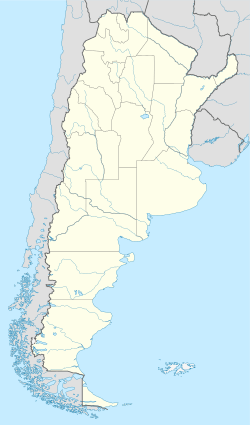Timbúes facts for kids
Quick facts for kids
Timbúes
|
|
|---|---|
| Country | Argentina |
| Province | Santa Fe |
| Department | San Lorenzo |
| Area | |
| • Total | 185 km2 (71 sq mi) |
| Population | |
| • Total | 3,325 |
| • Density | 17.97/km2 (46.55/sq mi) |
| Time zone | UTC-3 (ART) |
| CPA base |
S2204
|
| Dialing code | +54 3476 |
Timbúes is a town, also called a comuna, in the province of Santa Fe, Argentina. It is home to about 3,325 people, based on a census from 2001. The town is located in the southern part of the province. It sits where the Paraná River and the Carcarañá River meet. Timbúes is about 30 kilometers north of Rosario and 144 kilometers south of Santa Fe, the provincial capital. You can find it along National Route 11.
Discover Timbúes
Timbúes is an interesting town with a rich history. It plays an important role in the region's industry.
A Look at History
Timbúes began as an agricultural colony. This happened in 1868. The land was bought by Camilo Aldao and José María Cullen. José María Cullen was a former governor of the province. The colony was first named Colonia Jesús María.
The settlement was officially recognized on July 15, 1871. The first local leaders were chosen on September 2, 1874. In 1892, the Ferrocarril General Manuel Belgrano railway reached the colony. The train station was named Timbúes. Over time, this name became popular for the town itself. The town's name was officially changed to Timbúes in 1974. The name Timbúes comes from an indigenous tribe. This tribe used to live in the area.
Industry and Energy
Timbúes is at the northern end of the Industrial Corridor. This area has many large and medium-sized factories. It also has many important ports. The Industrial Corridor is centered around Rosario and stretches up to San Nicolás de los Arroyos.
In 2006, plans were made to build a thermal power plant in Timbúes. This plant is called the San Martín Thermoelectric Central. It was built by Siemens AG. The project cost about 570 million USD. It was planned to generate 555 MW of power by May 2008. By April 2009, it was expected to generate 824 MW. This plant helps provide electricity for the region.
See also
 In Spanish: Timbúes (localidad) para niños
In Spanish: Timbúes (localidad) para niños
 | George Robert Carruthers |
 | Patricia Bath |
 | Jan Ernst Matzeliger |
 | Alexander Miles |


